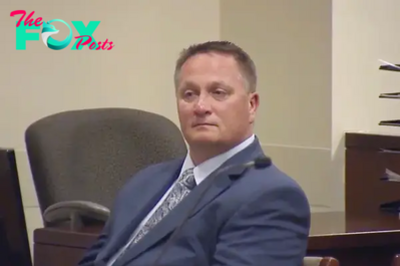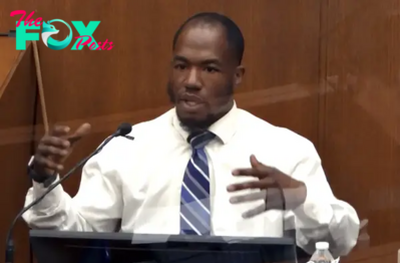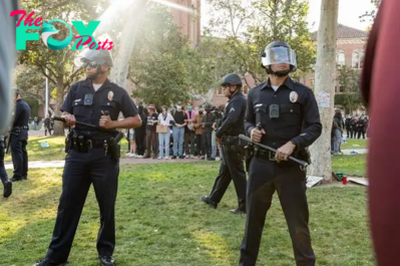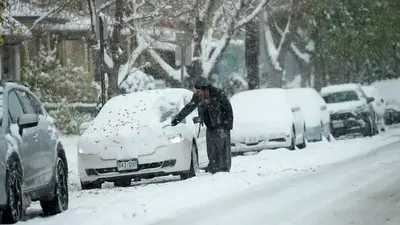US News
California's unhoused population struggles with sky-high rent: 'Once you get behind, you just can't get up'
In parts of San Francisco, unhoused Americans like Anthony, a former restaurant worker, regularly move street to street as city officials come in to clean up their encampments.
Anthony, who asked not to use his last name due to privacy concerns, says he has been living in a tent on the street for three years. Before the pandemic, he says he did mostly chef work, but he began to struggle to afford housing once restaurants temporarily closed.
“Once you get behind, you just can’t get up,” Anthony told ABC News.
Anthony is one of over 170,000 unhoused Californians struggling to find a permanent home, according to the California Budget and Policy Center. That’s nearly a third of the nation’s rising homeless population of 582,462 people, according to the U.S. Department of Housing and Urban Development.

For people like Nelly Sorto, a mom of two young children who works full time cleaning homes, it’s all but impossible to break into the city’s rental market.
The city’s minimum wage is $18.07 an hour, but the average rent for a one-bedroom apartment is roughly $3,000 a month, according to the city of San Francisco and online rental platform Zumper.com.
Sorto told San Francisco-based affiliate KGO-TV that she lived in an RV with her children for over a year before recently obtaining rental assistance from the city and moving into an apartment.
Experts point to several reasons for the rising homeless population in San Francisco, including the high cost of living related to the tech boom, the economic downturn during the pandemic and mental health issues experienced by many individuals.
“California has systemic issues in terms of its housing affordability, where it is a very popular place to live that has driven up rents and the rents are a direct cause of homelessness,” Jennifer Friedenbach, executive director of the Coalition on Homelessness, told ABC News. “So, what we need to do in California is really have a massive investment to offset that difference between incomes and rent.”
MORE: Homeless populations vulnerable amid poor air quality and smoke: Advocates
FriedeNBAch calls the homelessness crisis a “manufactured issue” created by a “lack of investment.”
Meanwhile, many across the state say they’re frustrated with the growing encampments in their cities.
Jeanne Vasquez, a Hollywood resident, spoke to ABC Los Angeles in July about the encampment in her area, saying, “There’s needles on the ground, also there’s a lot of broken glass. You’re getting catcalled…You're getting people that have mental illness. You're seeing profanity. Sometimes you see people naked."
President Joe Biden announced over the summer an extra $3 billion in investment focusing on veterans and including rental assistance, legal help and job search support.
On the campaign trail, GOP presidential hopefuls, including Florida Gov. Ron DeSantis and former President Donald Trump, have pointed to the homeless crisis in blue states to slam Democratic leadership.
In one campaign ad, Trump promises to “ban urban camping" if elected.

“Violators of these bans will be arrested but they will be given option to accept treatment and services if they’re willing to be rehabilitated. Many of them don’t want them,” Trump says in the ad.
Friedenbach says such a policy would essentially criminalize the homeless and she believes the federal government needs to spend more time listening.
“Very rarely are candidates centering unhoused people's needs in when they develop platforms before they're making statements,” FriedeNBAch said.
To address the crisis, Friedenbach said the federal government should invest in housing vouchers like Section 8, along with short, medium and long-term housing subsidies so people can stay in their homes if they were to face a catastrophic health issue or job loss. Friedenbach also calls for investment in behavioral health and reforming substance use and mental health treatment systems to work better for people.
MORE: As incidents of violent crime by the homeless grab headlines, activists urge caution and solutions
In a statement, a spokesperson for the San Francisco Department of Emergency Management told ABC News, “San Francisco outreach teams do an exceptional job of placing people who are interested in going inside into shelter or housing. Unfortunately, most people either decline to engage, decline offers of shelter, or have shelter already and we cannot compel to come inside.”
Anthony has been offered a place to stay that would get him off the streets, but there are still thousands of people on the streets looking for a place to call home.
There are at least 350 unhoused individuals who are still on the waitlist for housing as of Sept. 27, according to San Francisco's Department of Homeless and Supporting Housing waitlist.
This story is part of the ABC News politics series, “Ground Game,” examining issues that matter most to American voters ahead of the 2024 presidential election.
-

 US News23m ago
US News23m agoU.S. Government Needs to ‘Get It Right’ on Artificial Intelligence
-

 US News19h ago
US News19h agoParamedic Who Injected Elijah McClain With Ketamine Before His Death Avoids Prison
-

 US News1d ago
US News1d agoAmateur Wall Street Investors are Making Millions Rooting for Trump’s Truth Social to Fail
-

 US News1d ago
US News1d agoU.S. Announces New Patriot Missiles for Ukraine as Part of $6B Aid Package
-

 US News1d ago
US News1d agoMinneapolis Approves $150K Settlement for Witness to George Floyd’s Murder
-

 US News1d ago
US News1d agoBiden Administration to Implement Most Sweeping Gun Export Regulations in Decades
-

 US News1d ago
US News1d agoHow TIME100 Gala Attendees Reacted to Harvey Weinstein’s Overturned Rape Conviction
-

 US News1d ago
US News1d agoUSC Cancels Main Commencement Ceremony Amid Israel-Hamas War Protests



























